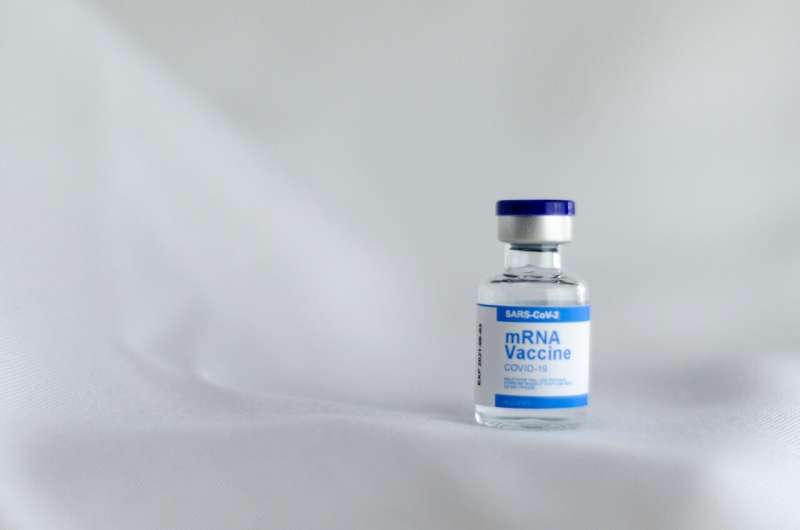Phase 3 trial results: mRNA-1273 vaccine continued to be safe and efficacious more than five months after second dose

Findings published in the New England Journal of Medicine add support and new insight to the high level of protection against COVID-19 that vaccines can confer. The final analysis of results of the Coronavirus Efficacy (COVE) trial, the phase 3, randomized, observer-blind, placebo-controlled clinical trial of Moderna's mRNA-1273 vaccine, indicate that the vaccine remained safe and efficacious throughout the trial's blinded phase, which included an average of 5.3 months of follow-up after trial participants received the second dose of the vaccine.
Separately, the research team has also published, as a preprint available on MedRxiv, an exploratory analysis of incidence of COVID-19 among participants who had received the vaccine early (between July and October 2020) and those who had initially received the placebo and were then vaccinated between December 2020 and March 2021. This analysis focused on cases of COVID-19 during July and August of 2021, when the Delta variant surged in the U.S. Findings from the exploratory analysis indicated that there was less incidence of COVID-19 among participants vaccinated more recently.
"Overall, we observed lower incidence rates of COVID-19 cases in July and August among participants vaccinated more recently, but it's important to keep in mind that the numbers we are seeing are far from a decay back to original risk," said co-corresponding author Lindsey Baden, MD, of the Division of Infectious Diseases at Brigham and Women's Hospital. "The message here is not that if you were vaccinated early, you're not protected. Those vaccinated more recently may be experiencing a marginal improvement, but both groups are benefitting from protection compared to people who remain unvaccinated."
The COVE trial initially enrolled 30,420 adult participants at 99 U.S. sites, including over 600 participants enrolled at the Brigham, which served as a site for the trial as part of the COVID-19 Prevention Network (CoVPN), funded by the National Institutes of Health. Eligible participants were aged 18 years or older with no known history of SARS-CoV-2 infection and whose locations or circumstances put them at appreciable risk of SARS-CoV-2 infection and/or high risk of severe COVID-19. Participants were randomized to receive their first injection between July 27 and Oct. 23, 2020, followed by a second injection 28 days later.
After the U.S. Food and Drug Administration granted Emergency Use Authorization for mRNA-1273, the trial's protocol was amended to make it a two-part phase 3 study. Part A, the observer-blind phase, concluded in March, by which time nearly all participants who had initially been randomized to receive the placebo had all crossed over and received the vaccine. Part B of the study, the open-labeled phase, is currently ongoing and participants will be followed for up to two years as planned.
"The rapid redesign of the COVE study allowed us to successfully maintain participants in the study and will allow us to study longer-term safety and efficacy," said Baden. "Using established and novel study methods, we've been able to continue to compare outcomes for those who were vaccinated earlier versus later in the study population."
The peer-reviewed NEJM paper details the findings from Part A of the study. Starting 14 days after the second dose, the vaccine efficacy was 93.2 percent for the prevention of COVID-19 compared to placebo. Efficacy against severe disease was 98.2 percent, with two cases of severe COVID-19 among the 15,180 participants in the mRNA-1273 group compared to 106 among the 15,206 participants in the placebo group. Prevention of COVID-19 remained consistent across the follow-up period, with greater than 90 percent vaccine efficacy against disease observed four or more months after the second injection.
Safety data were assessed continuously throughout the trial, including severe adverse events. The team solicited data on local and systemic adverse events seven days after each injection and collected data on unsolicited adverse events 28 days after each injection. More people in the group that received the vaccine reported side effects in the seven days following vaccination (such as fatigue, muscle aches, joint pain and headaches). The frequency of other adverse events—including severe adverse events—were generally similar between the vaccine and placebo group, regardless of age.
Vaccine efficacy was consistently high in subgroups, including participants who were 65 and older, 75 and older, those with comorbidities, different racial and ethnic groups, and different categories of occupational risk exposures. In secondary analyses, researchers also found substantial protection against asymptomatic infection.
For the medRxiv preprint, the research team analyzed data from July through August 2021 for 14,746 participants in the earlier vaccination group (vaccinated before December 16, 2020) and 11,431 in the later vaccination group (vaccinated between December 29, 2020 and April 30, 2021). The data revealed that 162 COVID-19 cases occurred in the earlier vaccination group and 88 in the later vaccination group. There were also fewer cases of severe COVID-19 in this later group—6 compared to 13. (The authors note these cases are pending adjudication by the endpoint adjudication committee.)
"Overall, our results continue to demonstrate that vaccines work and work extremely well at preventing COVID-19," said Baden. "We are continuing to explore questions about duration of immunity following vaccination and the impact of variants. But even as we examine the possibility of waning immunity, we see evidence that the vaccine is still very protective."
More information: Hana M. El Sahly et al, Efficacy of the mRNA-1273 SARS-CoV-2 Vaccine at Completion of Blinded Phase, New England Journal of Medicine (2021). DOI: 10.1056/NEJMoa2113017





















